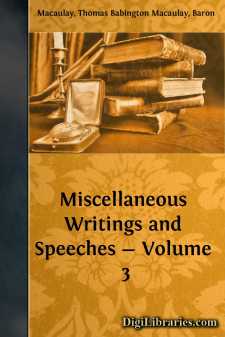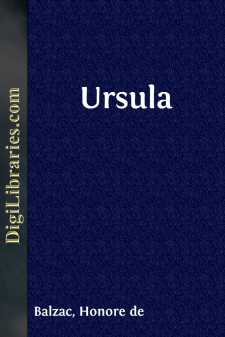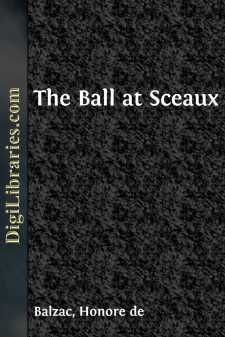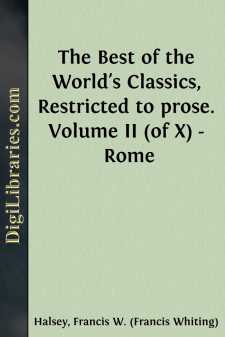Literary Collections
- American 84
- Ancient, Classical & Medieval 14
- Asian 1
- Australian & Oceanian 1
- Canadian 55
- Continental European 121
- English, Irish, Scottish, Welsh 179
- Essays 160
- General 24
- Letters 46
- Middle Eastern 1
Literary Collections Books
Sort by:
FIRST PART. LIFE'S JOYS AND SORROWS.1783 TO 1815. 1.TO THE ELECTOR OF COLOGNE, FREDERICK MAXIMILIAN. ILLUSTRIOUS PRINCE,-- Music from my fourth year has ever been my favorite pursuit. Thus early introduced to the sweet Muse, who attuned my soul to pure harmony, I loved her, and sometimes ventured to think that I was beloved by her in return. I have now attained my eleventh year, and my Muse often...
more...
FRANCIS ATTERBURY. (December 1853.) Francis Atterbury, a man who holds a conspicuous place in the political, ecclesiastical, and literary history of England, was born in the year 1662, at Middleton in Buckinghamshire, a parish of which his father was rector. Francis was educated at Westminster School, and carried thence to Christchurch a stock of learning which, though really scanty, he through life...
more...
PREFACE As the reader, if he wishes, may discover without undue delay, the little volume of modern prose selections that he has before him is the result of no ambitious or pretentious design. It is not a collection of the best things that have lately been known and thought in the American world; it is not an anthology in which "all our best authors" are represented by striking or celebrated...
more...
by:
Honore de Balzac
CHAPTER I. THE FRIGHTENED HEIRS Entering Nemours by the road to Paris, we cross the canal du Loing, the steep banks of which serve the double purpose of ramparts to the fields and of picturesque promenades for the inhabitants of that pretty little town. Since 1830 several houses had unfortunately been built on the farther side of the bridge. If this sort of suburb increases, the place will lose its...
more...
by:
Honore de Balzac
I. THE LORRAINS At the dawn of an October day in 1827 a young fellow about sixteen years of age, whose clothing proclaimed what modern phraseology so insolently calls a proletary, was standing in a small square of Lower Provins. At that early hour he could examine without being observed the various houses surrounding the open space, which was oblong in form. The mills along the river were already...
more...
by:
Various
SPECIAL INTRODUCTION Among the absurd notions as to what the Talmud was, given credence in the Middle Ages, one was that it was a man! The mediaeval priest or peasant was perhaps wiser than he knew. Almost, might we say, the Talmud was Man, for it is a record of the doings, the beliefs, the usages, the hopes, the sufferings, the patience, the humor, the mentality, and the morality of the Jewish people...
more...
by:
Ralph Connor
CHAPTER I THE GAME "Forty-Love." "Game! and Set. Six to two." A ripple of cheers ran round the court, followed by a buzz of excited conversation. The young men smiled at each other and at their friends on the side lines and proceeded to change courts for the next set, pausing for refreshments on the way. "Much too lazy, Captain Jack. I am quite out of patience with you," cried a...
more...
by:
Honore de Balzac
CHAPTER I. THE CHATEAU Les Aigues, August 6, 1823. To Monsieur Nathan, My dear Nathan,—You, who provide the public with such delightful dreams through the magic of your imagination, are now to follow me while I make you dream a dream of truth. You shall then tell me whether the present century is likely to bequeath such dreams to the Nathans and the Blondets of the year 1923; you shall estimate the...
more...
by:
Honore de Balzac
THE BALL AT SCEAUX The Comte de Fontaine, head of one of the oldest families in Poitou, had served the Bourbon cause with intelligence and bravery during the war in La Vendee against the Republic. After having escaped all the dangers which threatened the royalist leaders during this stormy period of modern history, he was wont to say in jest, "I am one of the men who gave themselves to be killed on...
more...
CATO, THE CENSOR Born in Tusculum, Italy, in 234 b.c., died in 149; celebrated as statesman, general, and writer; questor under Scipio in 204; Consul in 195; served in Spain in 194; censor in 184; ambassador to Carthage in 150; one of the chief instigators of the third Punic war; among his writings are "De Re Rustica" and "Origines." OF WORK ON A ROMAN FARM When the owner of the farm...
more...











